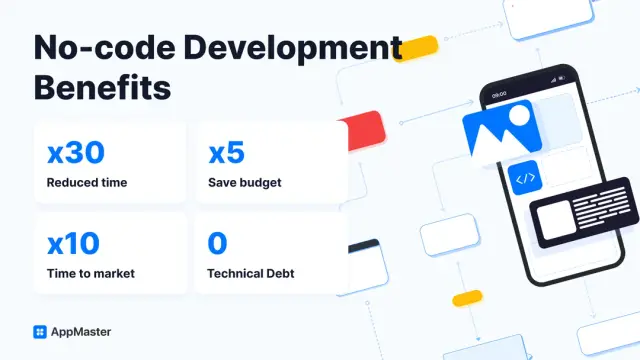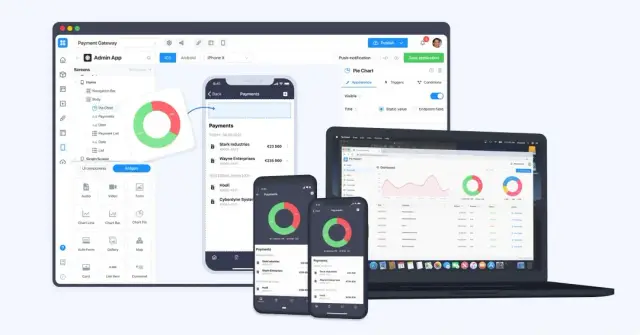Innovative Features in Android App Builders
In this comprehensive article, we examine the groundbreaking features implemented in Android app builders that have revolutionized app development and discuss how these innovations contribute to a faster and more efficient development process.

The Evolution of App Builders
The world of app development has come a long way since the early days of coding and programming. In the past, app development involved complex coding processes and required a team of skilled developers who could navigate through intricate programming languages. However, as technology has advanced and the need for mobile apps has grown exponentially, app builders have become easier to use and more efficient.
Initially, app builders were basic tools that provided limited features and functionalities, mostly revolving around simple design templates and user interfaces. As the demand for mobile apps increased, especially for Android devices, app builders evolved with greater customization and more sophisticated capabilities.
Today, Android app builders offer an incredible array of options for creating feature-rich and visually stunning applications that cater to users' diverse needs and preferences. They can streamline the app development process and allow developers to create apps without writing extensive lines of code. The rapid improvements and innovations in app builders have led to a new era in mobile application development.
Key Features in Current Android App Builders
Android app builders have come a long way over the years, and the current generation boasts several innovative features that make app development a breeze. Here are some key features you can expect to find in modern-day app builders:
- Visually designed UI components: With an intuitive drag-and-drop interface, developers can easily create and customize UI components according to their needs. This significantly reduces the time and effort spent on understanding and mastering complex UI design principles and coding.
- Pre-built templates and themes: App builders often come with diverse templates and themes that allow developers to choose the perfect design for their apps. These templates can easily be customized to match the app's brand identity and incorporate specific design elements as required.
- Built-in backend functionality: Modern app builders provide built-in backend functionality, often using ViewModel classes and data binding. Developers can easily enable data storage, authentication, notifications, and other essential app features without additional coding.
- Integration capabilities: App builders today enable seamless integration with third-party APIs and services. This offers a way to extend the app's functionality and leverage the capabilities offered by popular services, such as Google Maps, social media platforms, and e-commerce tools.
- Real-time app preview: Most app builders provide a real-time app preview feature that allows developers to see how changes in design and functionality will look on the target device. This greatly increases the efficiency of the development process, as developers can quickly test and tweak their designs without having to run a full build and deployment process.
- Publishing to app stores: To make the app development process complete, app builders often provide built-in functionality for publishing apps directly to the Google Play Store and other app marketplaces. This simplifies the app submission process and frees up development teams to focus on other tasks.
Benefits and Drawbacks of Using Android App Builders
As with any tool, Android app builders have their pros and cons. Here's a closer look at the benefits and drawbacks you should consider when deciding whether to use an app builder for your mobile application development project.
Benefits:
- Reduced development time and cost: App builders can save developers significant time and resources by streamlining the app design and implementation process. Using templates, drag-and-drop interfaces, and built-in backend functionality significantly reduces the time and effort required to create a functional app.
- Ease of use: App builders are designed to be user-friendly, allowing developers of all skill levels to create and customize mobile applications. This makes them ideal for small businesses, individual developers, and even beginners with limited coding and development experience.
- Simplified app testing and deployment: Android app builders often have real-time app preview and streamlined deployment processes. This allows developers to test their apps quickly, identify and fix issues faster, and deploy them to the Play Store more efficiently.
- Accessibility to advanced features and technologies: Modern app builders provide access to various advanced features and technologies (such as machine learning and AI), which would otherwise require considerable expertise and time to implement from scratch.

Drawbacks:
- Limited flexibility: While app builders offer an extensive set of features and components, they may not provide the level of flexibility and customization that some developers need, particularly for more complex app development projects.
- Dependency on the app builder platform: When using an app builder, developers may face limitations and restrictions imposed by the platform itself. Moreover, if the app builder platform experiences downtime or issues, it could impact the development process.
- Generic designs and templates: Though app builders offer a variety of pre-built templates and themes, their designs may sometimes appear generic, which could impact an app’s uniqueness and affect its performance in the app market.
Considering the benefits and drawbacks, Android app builders can be an excellent option for many types of application projects. However, it's crucial to evaluate your specific needs and the app builder platform's capabilities before making a decision.
How Do App Builders Compare to Traditional Methods?
App builders have emerged as viable alternatives to traditional app development methods, especially for entrepreneurs, small businesses, and those without extensive technical knowledge. As we compare app builders and traditional app development, we'll focus on factors such as time, cost, ease of use, and customization.
Time
One of the key advantages app builders have over traditional methods is the reduced development time. App builders use pre-built templates, visual design components, and drag-and-drop interfaces that enable quick app development without writing lengthy lines of code. In contrast, traditional app development demands extensive coding, which can be time-consuming for initial development and ongoing maintenance.
Cost
App builders can help reduce development costs significantly due to their simplified development process. With a lower learning curve and fewer specialized skills needed, businesses can avoid hiring expensive developers or outsourcing app development. However, traditional methods often require a dedicated team of developers, which can be cost-prohibitive for small businesses or startups.
Ease of use
The user-friendly interfaces of app builders make it easy for non-technical users to participate in the app development process. The learning curve for app builders is typically much lower than traditional methods, enabling individuals with limited coding experience to create functional and aesthetically pleasing apps. Conversely, traditional app development demands in-depth programming knowledge and specialized skills.
Customization
While app builders offer a vast range of pre-built templates and components, they may not provide the same level of customization as traditional app development methods. This factor becomes crucial when developing highly specialized apps that demand unique features or custom integrations. Traditional app development might offer more flexibility and control in certain aspects.
App builders are an excellent choice for those looking for a quick, easy, and cost-effective app development solution. Traditional app development still has its merits, particularly for apps with highly specific requirements. The choice between app builders and traditional methods should be based on budget, level of customization needed, and available resources.
Notable Examples of Android App Builders
Several Android app builders have gained prominence, each offering a unique suite of features. We will discuss a few notable examples and highlight AppMaster as the representative of innovative no-code platforms.
- Appy Pie: Appy Pie is a popular app builder with a drag-and-drop interface, customizable design elements, and a wide range of templates. It offers a cloud-based development environment, real-time app preview, and direct app publishing to app stores.
- BuildFire: BuildFire boasts a powerful app builder with various plugins, templates, and design elements. Its platform focuses on enabling businesses to develop custom apps with minimal technical knowledge by providing seamless integrations and a user-friendly interface.
- AppMachine: AppMachine is a versatile app builder with a visual development environment, enabling users to design, test, and publish apps with ease. It simplifies the development process with pre-built app components and templates tailored to different industries.
- AppMaster: As a powerful no-code platform, AppMaster enables users to create backend, web, and mobile applications with visual design components and a drag-and-drop interface. One of AppMaster's unique advantages is its ability to generate source code for applications, ensuring any changes to the project are easily incorporated without technical debt. With its comprehensive design environment, users can create data models, define business processes, and develop user interfaces for Android apps. The platform generates native mobile applications using Kotlin and Jetpack Compose, offering excellent performance and easy integration with existing Android ecosystems.

Improving App Development with AppMaster's No-Code Platform
AppMaster stands out among Android app builders due to its comprehensive no-code platform, offering tools and resources to streamline the app development process and optimize efficiency. Some of the platform's key features include:
Visual Design Components
AppMaster offers a visually driven environment to design UI components, create data models, and define business logic, including the ability to preview the app in real-time without the need for full development.
Generated Source Code
Unique to AppMaster, the platform automatically generates source code for applications, eliminating technical debt by regenerating applications from scratch whenever changes are made. This feature ensures that your app remains up-to-date and adaptive to evolving requirements.
Integration Capabilities
AppMaster enables seamless integration with third-party services and APIs, allowing you to easily tap into advanced features and technologies.
Scalability
Given that AppMaster generates real applications, it offers excellent scalability for enterprise and high-load use-cases. The platform employs Go (golang) for backend applications and Kotlin with Jetpack Compose for Android apps, delivering high performance and seamless integration within the Android ecosystem.
Cost-Effectiveness
With pricing plans designed for different levels of app development, AppMaster aims to provide cost-effective solutions for small businesses, startups, and enterprises, further democratizing app development.
Android app builders have evolved tremendously over the years, offering innovative features that simplify app development and cater to various user groups. AppMaster, as a powerful no-code platform, brings the advantages of streamlined development, adaptability, and scalability, enabling you to easily create outstanding Android apps.
FAQ
An Android App Builder is a software tool that enables developers to create mobile applications for the Android platform without the need for extensive coding. These tools leverage drag-and-drop interfaces, visual design components, and pre-built templates to streamline the app development process.
The key features of Android App Builders include visually designed UI-components, pre-built templates and themes, built-in backend functionality, integration capabilities with APIs and third-party services, real-time app preview, and the ability to publish directly to app stores.
Android App Builders provide significant benefits such as reduced development time and cost, ease of use, simplified app testing and deployment, and easy access to advanced features and technology. They also empower non-technical users to participate in app development, democratizing the process.
App builders significantly reduce the complexity and time spent on app development compared to traditional methods. While traditional methods may offer more flexibility and control in certain aspects, app builders offer a faster, more cost-effective solution, particularly for small businesses and individuals with limited resources.
AppMaster is a powerful no-code platform for creating backend, web, and mobile applications. It enables users to visually design data models, business processes, and user interfaces, while generating source code, running tests, and deploying applications automatically. AppMaster's approach eliminates technical debt by regenerating applications from scratch whenever requirements are modified, thereby improving efficiency and scalability.
AppMaster provides a comprehensive no-code platform that enables users to create Android apps with a drag-and-drop interface, design UI components, and define business logic. The platform generates native mobile applications with Kotlin and Jetpack Compose, ensuring high performance and easy integration with existing Android ecosystems. Its real-time app preview and automated deployment features make the development process fast and seamless.





